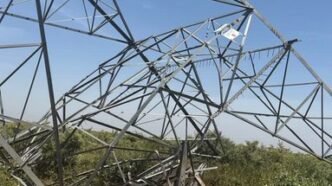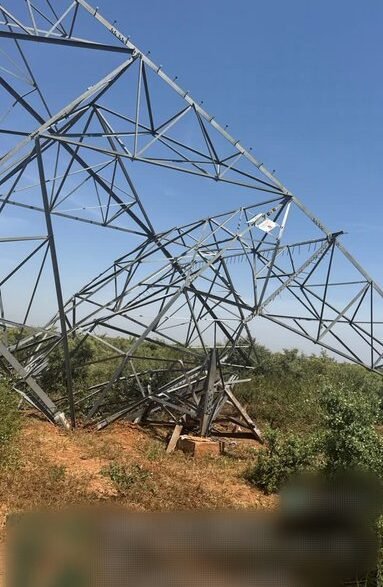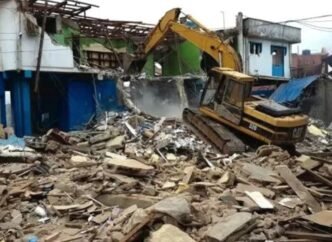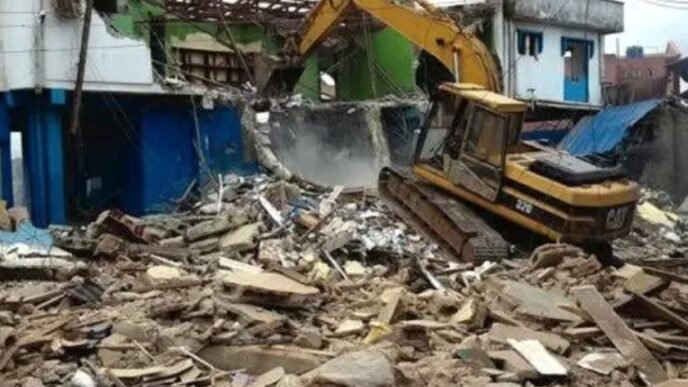The Transmission Company of Nigeria (TCN) has confirmed that suspected vandals have destroyed a key transmission tower along the Gombe–Damaturu 330kV transmission line, disrupting power supply to parts of Gombe, Yobe, and Borno States.
The incident, which occurred late Friday night, has once again raised concerns about the rising cases of infrastructure sabotage targeting the nation’s power transmission network.
In a statement released on Sunday, October 26, 2025, the TCN’s General Manager of Public Affairs, Ndidi Mbah, said the company’s technical team discovered the destroyed tower during a patrol assessment of the line after power supply was interrupted.
“Our 330kV Gombe–Damaturu transmission line has been vandalised. One of the transmission towers collapsed due to the deliberate removal of tower members by unknown persons. This act of sabotage has led to power supply interruption to parts of the North-East,” the statement read.
Extent of Damage and Immediate Impact
According to the Transmission Company, the affected structure, identified as Tower No. 254, collapsed completely, cutting off electricity supply from the Gombe Transmission Substation to the Damaturu Transmission Substation, which serves several communities in Yobe State.
The company stated that the vandalised section is part of a critical power route supplying energy to the North-East transmission network, including Borno, Yobe, Bauchi, and parts of Gombe.
“The destruction of this tower has caused an outage on the 330kV line, leaving several areas without electricity. Our engineers have been deployed to the site to begin emergency restoration work, and efforts are ongoing to mobilize materials and rebuild the collapsed structure,” Mbah added.
Residents in parts of Damaturu, Potiskum, Buni Yadi, and Gombe metropolis have since reported total blackout following the incident.
A power user in Damaturu, Malam Musa Garba, told journalists that electricity went off abruptly on Friday night and had not been restored since.
“We first thought it was a routine outage until we heard that a tower had been brought down by vandals. This is very disturbing,” he said.
Recurring Vandalism Threat
The TCN expressed deep concern over what it described as the persistent vandalism of its transmission infrastructure across the country.
In recent months, the company has recorded several similar incidents in various parts of Nigeria. Only in September 2025, two transmission towers along the Jos–Gombe 330kV line were destroyed by suspected vandals, leading to weeks of repair work and widespread power supply disruptions across the North-East.
“The continued attacks on our transmission infrastructure pose a serious threat to the stability of the national grid and the reliability of power supply. These acts of sabotage not only cause massive financial losses but also undermine efforts by the Federal Government to improve electricity access,” the TCN spokesperson stated.
The company lamented that rebuilding a single collapsed transmission tower costs tens of millions of naira, excluding the cost of manpower, logistics, and downtime losses.
Government and Security Response
Following the incident, the Ministry of Power said it had directed law enforcement agencies to launch a full investigation into the attack and ensure the perpetrators are brought to justice.
A senior official from the ministry, who spoke on condition of anonymity, confirmed that the Nigeria Security and Civil Defence Corps (NSCDC), which is responsible for protecting critical national infrastructure, has been alerted and deployed to the area.
“We are working closely with security agencies to secure the right-of-way for transmission lines across the country. It is unacceptable that some individuals continue to endanger national assets for selfish gains,” the source said.
In a similar reaction, the Gombe State Commissioner for Energy and Natural Resources, Abubakar Bello, condemned the act and called for stronger surveillance around power installations.
“This is a criminal act against the collective interest of Nigerians. Power is vital to our economy, and any attack on it is an attack on national development. We will work with TCN and security agencies to prevent a recurrence,” Bello stated.
TCN’s Restoration Efforts
The Transmission Company assured consumers that emergency restoration work has already begun to rebuild the collapsed tower and restore the damaged transmission line.
“Our maintenance and engineering team has been mobilized to the site for assessment and reconstruction. We are committed to restoring power to the affected areas within the shortest possible time,” Mbah said.
The company appealed for patience and cooperation from electricity users in the North-East while repairs are ongoing.
She also revealed that TCN is exploring innovative security solutions, including the use of drones, surveillance patrols, and remote sensors, to monitor its vast network of over 20,000km of transmission lines nationwide.
Economic and Social Implications
Experts have warned that continuous vandalism of energy infrastructure could derail Nigeria’s progress toward achieving stable electricity supply.
The North-East region, already recovering from years of insurgency, depends heavily on reliable power to sustain economic activities, small businesses, and social services such as hospitals and water treatment plants.
An energy analyst, Dr. Ibrahim Musa, described the repeated attacks as “a major threat to regional development and national energy security.”
“Every time a transmission line is vandalised, thousands of homes and businesses suffer. It discourages investment in the energy sector and costs the nation billions annually in repair and lost productivity,” he explained.
He urged the Federal Government to prioritise the protection of critical infrastructure and introduce stiffer penalties for vandals.
Past Incidents and Security Gaps
Records show that between 2023 and 2025, the TCN has reported more than 45 cases of vandalism across its transmission network. These include theft of cables, removal of tower members, destruction of insulators, and sabotage of power substations.
In April 2025, vandals brought down two towers on the Kano–Kaduna line, while another incident in Benue State in July affected the Makurdi–Otukpo transmission corridor.
Despite ongoing efforts to improve security, the company admits that patrolling thousands of kilometers of power lines across remote and forested terrain remains a major challenge.
TCN has repeatedly appealed to communities living near transmission routes to report suspicious movements to security agencies.
“Protecting power infrastructure is a collective responsibility. We urge citizens to remain vigilant and help us safeguard these assets that serve all Nigerians,” the company said.
Call for Community Collaboration
Security experts say community engagement and public sensitisation are key to preventing future vandalism.
They advise the government to collaborate with local vigilantes and traditional rulers to enhance monitoring around transmission routes.
“The solution is not only in deploying security personnel but also in mobilising community participation. When people understand the value of public infrastructure, they become its protectors,” said security analyst Colonel (Rtd.) John Onuche.
He also suggested the installation of anti-climb devices, CCTV cameras, and geofencing technology on high-risk routes.
Conclusion
The destruction of the Gombe–Damaturu transmission line once again highlights Nigeria’s persistent struggle with vandalism of national infrastructure.
As TCN begins emergency restoration work, residents in the affected North-East communities are anxiously awaiting the restoration of power supply.
Experts, meanwhile, continue to call for tougher laws, improved security, and stronger community collaboration to protect the backbone of Nigeria’s power network.
Until these challenges are addressed, the dream of achieving reliable and uninterrupted power supply across the country may remain elusive.














